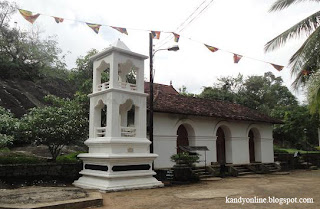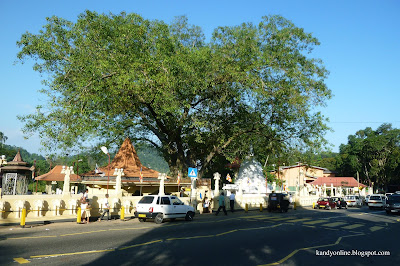Temples in Kandy
Temples
in Kandy






























Gadaladeniya Temple (Gadaladeniya Viharaya)

Gadaladeniya
Temple in Kandy was established on the plane rock at Diggala. Diggala is
located in the region of Kandy. Gadaladeniya Temple, Kandy has an old
monastery. It is a beautiful temple which you can visit during your tour to
Kandy. Gadaladeniya Temple in Kandy is one of the well-known tourist
destinations in Kandy Gadaladeniya Temple in Kandy was constructed in the year
1344 by King Buwanekabahu IV in accordance to an inscription written here in
this temple. The Gadaladeniya Temple in Kandy was designed by many architects.
But one of the main architects was Ganesvarachari, who was a South Indian. As a
result, the Gadaladeniya Temple in Kandy is designed in South Indian
architecture.
 |
Lankatilake Temple (Lankatilake Viharaya)
The
Lankathilaka temple, situated on the outskirts of Kandy, is one of the finest
examples of

Sinhalese temple architecture. More info and images inside. The
temple was completed in 1334 by king Buwanekabahu IV, who had chosen Gampola as
his kingdom. The five kings who ruled from Gampola made significant
contributions to art and culture. The Gadaladeniya and Embekke temples, which
will be covered in future posts, are also from this period.The Image house
contains devales to the four guardian deities of the island, each with his
consort. A Pali inscription can be found on the rock which the temple is built
on and it is supposed to be a record of the valuable gifts given to craftsman
who worked on the temple. The exterior of the image house is decorated with
sculpted elephants and other decorative designs. The arched passage of the
image house leads into an inner sanctum which is decorated with floral designs.
The two side walls and the ceiling are covered with paintings and the inner sanctum
contains a huge statue of the seated Buddha under a "Makara Thorana".
I was unable to go into the image house as the priest was not around and the
image house was locked. However, I was able to take a few shots of the artwork
that decorated the main door to the image house.




Embakke Temple (Embakke Devalaya)
Gampola was
made as the capital city of the Island by the King Buwanekabahu the fourth, who
ruled  for 4 years in mid fourteenth century. The last king of Gampola was King
Buwanekabahu the fifth. He ruled the Island for 29 years. A separate city was
build in Kotte during this time by a noble known as Alagakkonara.
for 4 years in mid fourteenth century. The last king of Gampola was King
Buwanekabahu the fifth. He ruled the Island for 29 years. A separate city was
build in Kotte during this time by a noble known as Alagakkonara.
Among the remnants of Gampola era, the most famous temples are Lankathilaka, Gadaladeniya and Ambekka Dewalaya. The ancient stone scripts (Shila Lekhana) of Lankathilaka temple helps to reveal a considerable amount of vital information regarding the Gampola era. The statue of Buddha of the temple indicates style of south Indian arts. The Ambekka Dewalaya possess a large collection of wood carvings, where no other temple in Sri Lanka owns such a collection.
 for 4 years in mid fourteenth century. The last king of Gampola was King
Buwanekabahu the fifth. He ruled the Island for 29 years. A separate city was
build in Kotte during this time by a noble known as Alagakkonara.
for 4 years in mid fourteenth century. The last king of Gampola was King
Buwanekabahu the fifth. He ruled the Island for 29 years. A separate city was
build in Kotte during this time by a noble known as Alagakkonara.Among the remnants of Gampola era, the most famous temples are Lankathilaka, Gadaladeniya and Ambekka Dewalaya. The ancient stone scripts (Shila Lekhana) of Lankathilaka temple helps to reveal a considerable amount of vital information regarding the Gampola era. The statue of Buddha of the temple indicates style of south Indian arts. The Ambekka Dewalaya possess a large collection of wood carvings, where no other temple in Sri Lanka owns such a collection.




Degaldoruwa Temple (Degaldoruwa Viharaya)

This
cave temple is synonymous with the Kandyan era and famous of its paintings and
unique architecture.
The temple has been constructed in a place where two large granite rocks, soaring to about 40 feet, are facing each other and almost touching below.
A man made cave has been built by sheering the rocks, and this cave accommodates a Shrine Room and a landing. Temple records point out that the intricate paintings were the work of four painters. These paintings are recognized as some of the best examples of the Kandyan era paintings. Four “Jathaka Stories " (stories of the reincarnations of the Lord Buddha) are drawn at this cave temple of which one is the famous Vessantara Jathaka story. They are the best paintings found in Kandy other than Gangaramya.
The wall paintings at Degaldoruwa differ from many of other Kandiyan style paintings, the colors used and clothing of the people depicted are unique to other paintings of the era.
The temple has been constructed in a place where two large granite rocks, soaring to about 40 feet, are facing each other and almost touching below.
A man made cave has been built by sheering the rocks, and this cave accommodates a Shrine Room and a landing. Temple records point out that the intricate paintings were the work of four painters. These paintings are recognized as some of the best examples of the Kandyan era paintings. Four “Jathaka Stories " (stories of the reincarnations of the Lord Buddha) are drawn at this cave temple of which one is the famous Vessantara Jathaka story. They are the best paintings found in Kandy other than Gangaramya.
The wall paintings at Degaldoruwa differ from many of other Kandiyan style paintings, the colors used and clothing of the people depicted are unique to other paintings of the era.





Gegambe Temple (Getambe Viharaya)
Gatambe
Temple is one of the mostly worshiped places around Peradeniya. Gatambe Temple
is located closed by Peradeniya Botanical Garden with one side bordered by the
Mahaweli River.




Hindagala Temple (Hindagala Rajamaha Viharaya)

Hindagala
temple is very important place in Sri Lankan history since the Hindagala temple
is related to many of ancient legends and amazing wall paintings.
The architecture of the Hindagala Temple is also wonderful. The vihara
geya is totally built under a natural large rock. You can see many of ancient
architectural technologies such as "Kataram" and wooden joints.




Galmaduwa Temple (Galmaduwa Viharaya)

Galmaduwa
Vihara, a stone built temple is of singular interest as it exhibits features
not found in the other buildings of the Kandy period. It is of curious
composite design: encircling the dome is a structure consisting of seven
diminishing storeys, revealing a Tanjore influence, while around this is a
rectangular wall with arches that betray western influence. There would have
been an even older dagoba on this site before the Galmaduwa Vihara was built.








Comments
Post a Comment